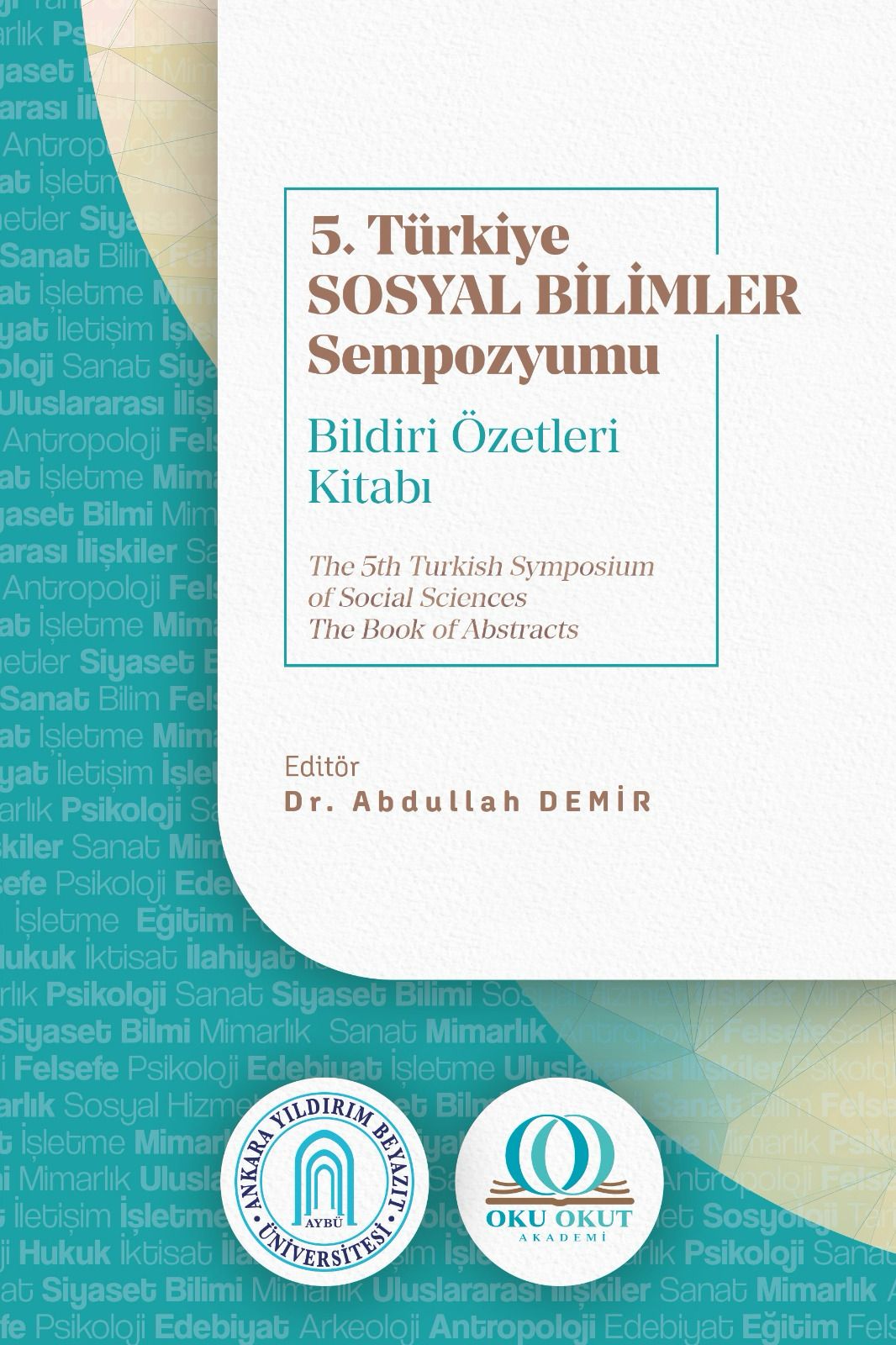Conceptions of Sacrifice in the Ocaks Affiliated with the Alevî Tradition
Alevî Geleneğe Mensup Ocaklarda Kurban Telakkileri
This study examines the concept of sacrifice within Alevi lodges, based on verses related to sacrifice and common understandings in the Islamic world. This study aims to examine the concept of sacrifice in Alevism in a comparative manner, considering the fundamental concept of sacrifice in other Muslim groups in the Islamic world. This qualitative research is a case study conducted using a descriptive method. The research data was obtained through document review, examining works belonging to the Alevi tradition and sources from other Muslim groups, and interviews with dedes who led the rituals within Alevi lodges. The data was then analyzed. The Alevi tradition is an umbrella term for lodges dominated by Sufi thought and religious practices. Therefore, a Sufi life is prominent in the Alevi tradition. While the Alevi tradition preserves the fundamental practices of Islam as they are prevalent among Muslims, it has shaped these practices within the framework of Sufi thought and religious practices. In the Islamic world, sacrifice is one of the acts of worship performed by all Muslims as a fardh, wajib, and sunnah. In the Alevi tradition, the concept of sacrifice, as found in Muslim schools of Islam, is interpreted through the metaphor of Abraham and Ishmael, God’s gift of a ram to them. Alevi-Bektashi circles generally embrace the prevailing understanding of sacrifice in Islam, offering it solely to God. They perform sacrifices with a view to symbolizing the willingness to sacrifice one’s most precious possession, even one’s own life, for God’s sake, as illustrated by the Quranic example of Abraham and Ishmael (Quran, As-Saffat, 37:99-110). Indeed, the Gülbanks recited during the rituals of sacrifice are a formalization of this understanding. Indeed, the expressions “Khalil’s sacrifice,” “Decree of the Exalted,” “Obedience of Ismail,” and “Tığ-i Cebrail” are the embodiment of this concept. The Alevi tradition has also incorporated the practice of sacrifice, based on this fundamental understanding, into the life of the Sufi order. This classification into “inner” and “outer” sacrifices is a clear indication of this. Internal sacrifices include the “İkrar Sacrifice,” “Görgü” Sacrifice, “Musahiplik” Sacrifice, “Düşkünlük Sacrifice,” “Dardan İndirme Sacrifice,” “Abd al-Musa” Sacrifice, “Muharram” Sacrifice, and “Hızır” Sacrifice. External sacrifices include the “Eid al-Adha” Sacrifice, “Vow Sacrifice,” “Thanksgiving” Sacrifice, “Nevruz” Sacrifice, “Shrift Visit” Sacrifice, and “Hıdırellez” Sacrifice. Therefore, the understanding of sacrifice in Alevism is completely consistent with the understanding of sacrifice in other Muslim groups in Islam.
Bu çalışmada, Kurban ile ilgili âyet-i kerimeler ve İslam dünyasında yaygın anlayışlar esas alınarak Alevî nitelemeli ocaklarda var olan kurban telakkileri incelenmektedir. Bu çalışma, Alevîlikteki kurban telakkisini İslam dünyasında diğer Müslüman gruplardaki temel kurban telakkisini göz önünde bulundurup mukayeseli bir biçimde ele almayı amaçlamaktadır. Nitel araştırma hüviyetli çalışmamız deskriptif/betimleyici yöntem esas alınarak yürütülmüş bir durum çalışmasıdır. Araştırmanın verileri, doküman taraması yöntemiyle Alevî geleneğe mensup eserler ve diğer Müslüman grupların kaynaklarının incelenmesi ve sahada Alevî ocaklarda erkan yürüten dedelerle yapılan mülakatlardan elde edilmiş; sonrasında elde edilen verilerin analiz edilmesiyle yürütülmüştür. Alevî gelenek tasavvuf düşüncesi ve tarikat uygulamalarının hâkim olduğu ocaklar için kullanılan bir şemsiye kavramdır. Dolayısıyla Alevî gelenekte bir tasavvuf hayatı ön plandadır. Alevî gelenek İslam’ın temel ibadetlerinin Müslümanlar arasında yaygın olduğu şekliyle muhafaza etmekle beraber bunları tasavvuf düşüncesi ve tarikat hayatı kalıplarında şekillendirmiştir. İslam dünyasında kurban bütün Müslümanların farz, vacip, sünnet olarak yerine getirdikleri ibadetlerden birisidir. Alevî gelenekte kurban telakkisi, İslam’da Müslüman ekollerde var olan şekliyle Hz. İbrahim, Hz. İsmail, Allah’ın onlara koç hediye etmesi metaforu üzerinden anlamlandırılmıştır. Alevî-Bektaşî çevreler, kurban konusunda İslamiyet’teki yaygın anlayışı genel anlamda benimsemekte olup kurbanı sadece Allah’a sunarlar ve Kur’an’daki Hz. İbrahim-İsmail örneğiyle (Sâffât 37/99-110) ortaya konulan Allah yolunda, gerektiğinde canı bile olsa, en değerli varlığını O’nun için feda edebilmeyi sembolize eden bir anlayışla kurban keserler. Hatta kurban erkanlarında okunan gülbanklar da bu telakkinin formüle edilmiş halidir. Nitekim kurban-ı Halil, ferman-ı Celil, itaat-ı İsmail, tığ-i Cebrail ifadeleri bu durumun ete kemiğe bürünmüş halidir. Alevî gelenek bu ana telakkiye bağlı kurban ibadetini tarikat hayatına da taşımıştır. İçeri kurbanı ve dışarı kurbanı şeklinde yapılan bu tasnif bunun bir göstergesidir. İçeri kurbanları; İkrar Kurbanı, Görgü Kurbanı, Musahiplik Kurbanı, Düşkünlük Kurbanı, Dardan İndirme Kurbanı, Abdal Musa Kurbanı, Muharrem Kurbanı, Hızır Kurbanı. Dışarı kurbanları; Kurban Bayramı Kurbanı, Adak Kurbanları, Şükür Kurbanı, Nevruz Kurbanı, Türbe Ziyaret Kurbanı, Hıdırellez Kurbanı şeklindedir. Dolayısıyla Alevîlikteki kurban telakkisi İslam’ın diğer Müslüman gruplardaki kurban telakkisi ile birebir örtüşmektedir.

Telif Hakkı (c) 2025 Mesude Nur Temiz- Cenksu Üçer (Yazar)
Bu çalışma Creative Commons Attribution-NonCommercial 4.0 International License ile lisanslanmıştır.
CC BY-NC 4.0 lisansı, eserin ticari kullanım dışında, her türlü ortam ve formatta paylaşılmasına, kopyalanmasına, çoğaltılmasına ve orijinal esere uygun şekilde atıfta bulunmak kaydıyla yeniden düzenlenmesine, dönüştürülmesine ve eser üzerine inşa edilmesine izin verir.
Makale Bilgileri
- Konu Kelam - Mezhepler Tarihi
- Gönderim 23 Temmuz 2025
- Kabul 4 Ağustos 2025
- Yayım 29 Kasım 2025
- Sayı 5. Türkiye Sosyal Bilimler Sempozyumu
- Bildiri Bilim Alanı Kelam - Mezhepler Tarihi
Temiz, Mesude Nur - Üçer, Cenksu. “Alevî Geleneğe Mensup Ocaklarda Kurban Telakkileri”. Türkiye Sosyal Bilimler Sempozyumu 5 (November 29, 2025). https://doi.org/10.55709/tsbsdergisi.758






